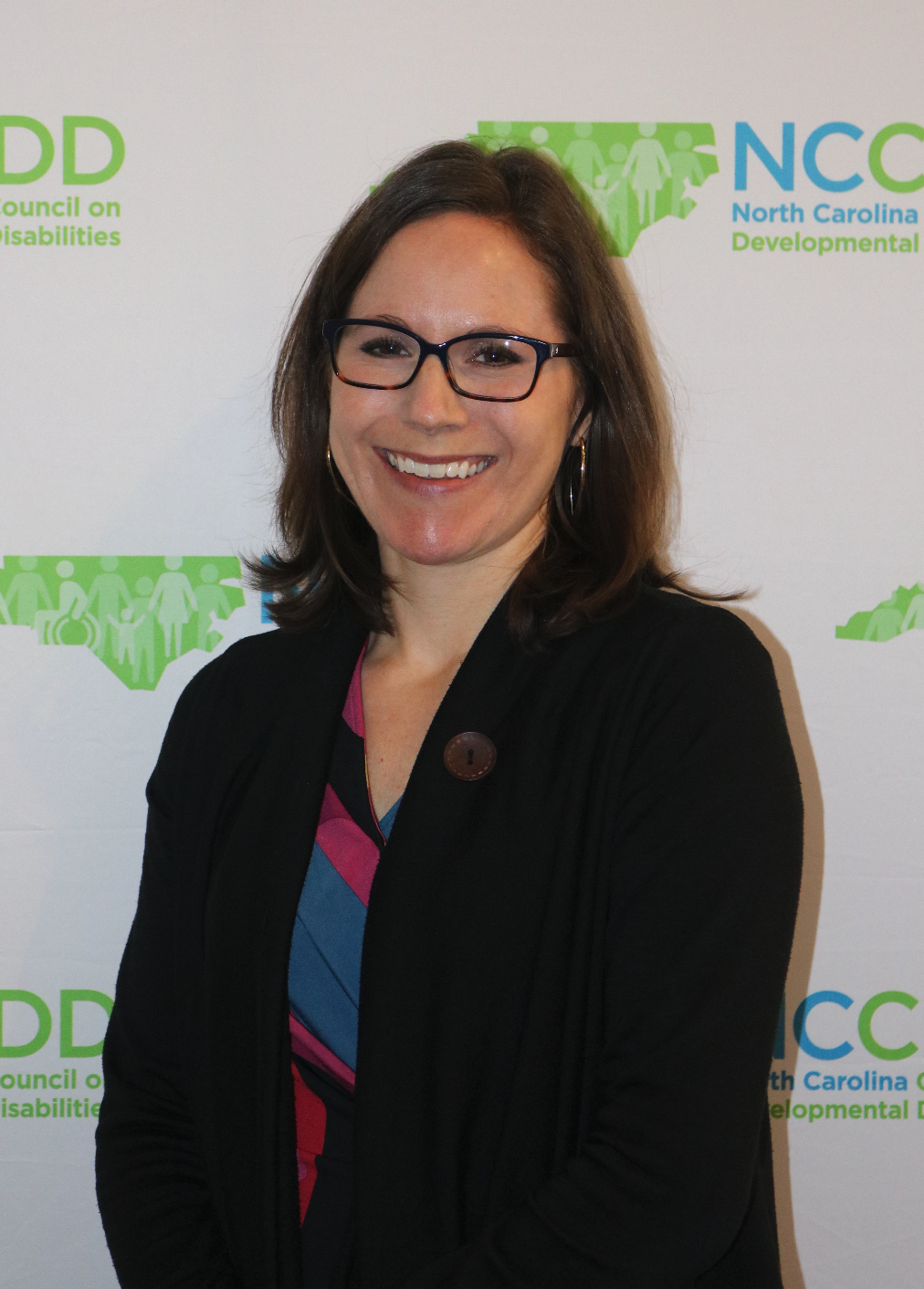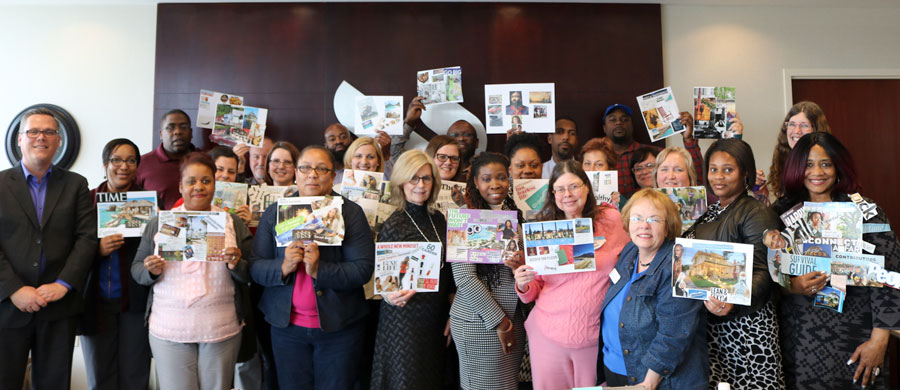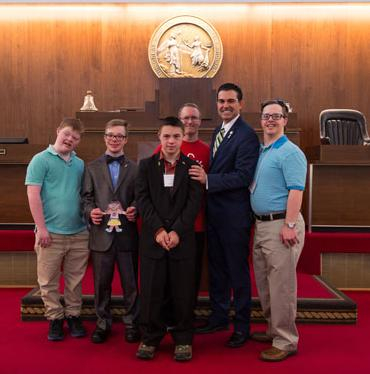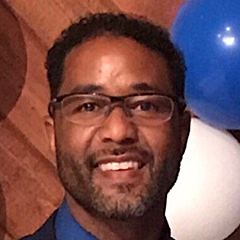April 2017: Highlights and Hot Topics

A Message from Our Executive Director
April is National Financial Capability Month, and we couldn’t have been more excited to spend time with NC State Treasurer Dale Folwell to focus on new tools to promote savings.
On April 10, 2017, Treasurer Folwell visited The Enrichment Center, an affiliated chapter of The Arc in Winston-Salem to promote North Carolina’s newly implemented ABLE (Achieving a Better Life Experience) program. Treasurer Folwell provided updates on NC ABLE, which includes new features such as checking and debit accounts that will bring even more independence for account holders by providing an easy way to pay for qualified disability expenses directly from funds in their accounts. We excited for individuals who will open these accounts!
We are also continuing our partnership with the National Disability Institute to expand capacity across NC to better understand and have access to information about savings and asset development through our Upward to Financial Stability initiative. In fact, last month, over 100 people attended our four Upward to Financial Stability Train-the-Trainer sessions. In keeping with the theme of National Financial Capability Month, NCCDD is excited to introduce a spending diary challenge! You can read about how the Council and people across the community celebrated DD Awareness Month.
On a separate note, we have a few people to welcome to the NCCDD! Travis Williams joined the staff in the job of Systems Change Manager and Dr. Kelly Kimple is one of our new Council members who will support our work across the State.
As always, we love hearing from the community about your thoughts, events and even your ideas on what can make your community a more inclusive place to for people with I/DD to live, work and play. Contact us here.
Chris Egan
Executive Director
State:
NC Legislative Bills: Crossover date is April 27. Crossover is the date by which a bill must pass out of one chamber and await action from the other in order to be eligible to move forward. Below are bills currently being tracked. Those that meet crossover will continue to be tracked.
HB 662 - Carolina Cares – This bill expands the buy-in option for Medicaid coverage for people who are under 133% of Federal Poverty Level and are age 19 – 64. Coverage includes an annual fee and co-payments. If implemented, Carolina Cares would be operated under the Medicaid Transformation Plan (1115 waiver) and DHHS may modify the 1115 demonstration waiver for Medicaid transformation that was submitted on June 1, 2016, to include Carolina Cares program. It does not expand Medicaid as comprehensively as some other states, but is a step in addressing some gaps in Medicaid coverage and may positively impact some individuals with I/DD.
SB 472 – Streamline CAP/CDSA Services Pilot – Authorizes Trillium Health Resources to manage and operate the Community Alternatives Program CAP-C, CAP-D and services required by Part C of the Individuals with Disabilities Education Act currently provided through the Children's Developmental Services Agencies (CDSAs) in its catchment area. This pilot would coordinate the management of community-based long-term services and supports for children and adults with disabilities and fragile medical conditions. There are some concerns about this bill because there are several complications related to CAP-C not being a managed care waiver and questions about case management and care coordination. This would require CMS approval.
SB 565 – People First 2017 – Requires all statutes to be reviewed and updated to person first language.
SB 471 - LRC/Transition to Sptd Empl/IDD Population – Authorizes the Legislative Research Commission to study issues related to improving the quality and availability of evidence-based services to support individuals with intellectual disabilities, developmental disabilities, or both in the preparation for, identification of, and maintenance of integrated, paid, competitive employment.
SB 327 - Drivers with Disabilities and Law Enforcement – Creates a voluntary designation on driver's licenses and registration plates for North Carolina residents with a mental illness, developmental disability or co-occurring mental illness and developmental disability. It also requires training for law enforcement officers on how to interact with a person the officer knows or reasonably should know has a mental illness, developmental disability or co-occurring mental illness and developmental disability. There are significant concerns about this bill. While the designation is voluntary, there are questions about the rights and protections of people who do not choose the designation. There are also concerns about who has access to the DMV database and subsequently to the designations.
HB 478 - Required Experience for MH/DD/SAS QPs - Amends the qualifications for Qualified Professionals within the Mental Health, Developmental Disability and Substance Abuse Services (MH/DD/SAS) system of care, as defined in rule, clinical care policies for the Medicaid program and the North Carolina Medicaid State Plan. Qualifications for Qualified Professionals shall allow for all years of full-time MH/DD/SAS experience to qualify as years of experience, rather than limiting qualifying full-time MH/DD/SAS experience to only that experience which is obtained post- bachelor's or graduate degree. There has been some concern about reducing the requirements and there are ongoing discussions about this bill. This change would require approval from CMS.
HB 515 - Adaptive Equipment Tax Benefit – Extends sales and use tax exemption, which currently exists for durable medical equipment, to equipment to assist a person with a disability into or out of a motor vehicle or to enable a person with a disability to operate a motor vehicle that is sold on a prescription or to a disabled veteran.
SB594/HB608 - Family/Child Protection & Accountability Act – The recent federal Child and Family Services Review (CFSR) and the North Carolina Statewide Child Protective Services Evaluation of the State's Child Protective Services (CPS) program identified troubling gaps and flaws in North Carolina's child welfare system that are allowing too many of those vulnerable children and fragile families to fall through the cracks. This bill reforms and dramatically changes the child welfare system in this state. It requires the state to develop a plan for a regional system of social services departments; establishes a child well-being transformation council to improve coordination, collaboration and communication among child-serving agencies; as well as some other specific changes. Many children in the Child Protective Services in NC have I/DD and there are needed changes to the system.
HB149 - Students with Dyslexia and Dyscalculia: This bill seeks to require State and Local Boards of Education to implement a screening program to identify students with dyslexia and dyscalculia.
HB170 – Pilot/Sports for Students with Disabilities: This bill seeks to authorize the Department of Public Instruction to develop a pilot program on integrated community-based adapted sports programs for students with disabilities.
HB139 – Mental Health Workers’ Bill of Rights - This bill enumerates several “basic rights” individuals who provide care for people with special needs, e.g., a right to refuse excessive overtime, right to be briefed about behaviors of individuals for whom they care, etc.
HB 11 - Handicap Parking Privilege Certification – Extends the ability to provide certification for a distinguishing license plate, removable windshield placard or temporary removable windshield to licensed physician assistants, licensed nurse practitioners, licensed certified nurse midwives. Currently licensed physicians, licensed ophthalmologists, licensed optometrists and the Division of Services for the Blind can provide the certification.
SB 520 - Emergency Worker Protection Act – This legislation which makes assault on emergency personnel, including medical personnel, passed in a previous legislative session. This bill expands the coverage to more personnel. There has been concern about how this may affect people who are seeking help in a crisis situation. The bill coming back up this session may provide an opportunity to create a defense of certain actions if related to a disability.
HB 821 – NC Guardianship Bill of Rights – This bill seeks to maintain, to the greatest extent possible, the fundamental rights of individuals who have been adjudicated incompetent or who are being considered for placement under guardianship. It includes a comprehensive list of rights for people already under guardianship and for people who are being considered for guardianship.
HB 657 - Improve Adult Care Home Regulation – This is a lengthy bill which covers many aspects of the regulation of Adult Care Homes. One part of the bill modifies the minimum training for Personal Care Aides and eliminates previous requirements for training in ‘Cognitive, behavioral, and social care’ and ‘Residents rights’. While adult care homes are not appropriate settings for individuals with I/DD for multiple reasons, there are people with I/DD in those settings, so reducing requirements for training is concerning.
Federal:
Schedule: The House and Senate were in recess through April 21st, and many elected officials met with constituents during this time.
Health insurance and long term services and supports: Although the American Health Care Act (H.R. 1628), legislation to repeal the Affordable Care Act and fundamentally alter the Medicaid program, was pulled from the floor in late March, negotiation continues between the Administration and members of Congress in an effort to garner future support. [For more information on how these changes could impact people with disabilities: importance of maintaining the current Medicaid funding structure and how the Affordable Care Act impacts people with disabilities.]
The Trump administration issued final regulations, directives to federal agencies that have the force of law, which will alter the current Affordable Care Act including: 1. Reducing the open enrollment period from three months to six weeks, 2. Pre-approval of any individual enrolling outside that open window, and 3. New billing requirements prior to enrolling in 2018. Qualified Health Plans will be taking these changes and continued programmatic uncertainty into account as filing deadlines for participation in the ACA and 2018 rate setting loom.
Federal funding - Fiscal Year 2017: Most federal agencies and the programs they oversee are funded through April 28, 2017, when the current continuing resolution (CR) expires. Congress will need to pass an additional continuing resolution to avoid a government shutdown. DD Councils, one of many programs impacting individuals with I/DD and their families, is federally funded.
Fiscal Year 2018: President Trump is expected to offer a comprehensive budget in May. Congress will likely present its budget after the President’s full budget is released.
NC Treasurer Promotes ABLE Program in Winston-Salem NC Treasurer Dale Folwell promoted the NC ABLE program at The Enrichment Center in Winston-Salem on April 10, 2017. He met with parents, professionals and people with disabilities to explain the new financial program that allows people with disabilities to save $14,000 annually without risking their Medicaid and SSI benefits.
NC Treasurer Dale Folwell promoted the NC ABLE program at The Enrichment Center in Winston-Salem on April 10, 2017. He met with parents, professionals and people with disabilities to explain the new financial program that allows people with disabilities to save $14,000 annually without risking their Medicaid and SSI benefits.
“ABLE Act stands on the shoulders of Senator Richard Burr and many others who brought this idea and pushed the act to become law,” said Treasurer Folwell.
North Carolina is a part of a 17-state consortium.
“By being in a consortium with states like Illinois, we can increase our impact,” said Folwell. “Every month, there is a new state that is interested in joining the consortium, and we are well on our way to become the largest ABLE consortium in the country.”
The ABLE program is now open for enrollment. For more information visit, https://savewithable.com/nc/home.html
Council Member Spotlight: Dr. Kelly Kimple
“As a pediatrician, I have cared for many children with developmental disabilities and have experienced the struggles these children and families face in every aspect of their lives,” explains Dr. Kelly Kimple who serves on the North Carolina Council on Developmental Disabilities (NCCDD) representing the North Carolina Division of Public Health (DPH).
“In my experience, limited community and financial resources to assist these families have been a challenge, in addition to navigating the system,” she adds.
Dr. Kimple sees and experiences quite a bit in her job as the Chief of Women’s and Children’s Health Section in DPH at the Department of Health and Human Services (DHHS) and as the state Title V Director. In this position, she oversees many programs including the Special Supplemental Nutrition Program for Women, Infants and Children (WIC), Early Intervention, Immunizations, School Health, Newborn Metabolic and Hearing Screening, Perinatal Health, Reproductive Life Planning, Child Maltreatment Prevention, Maternal, Infant and Early Child Home Visiting, programs for Children with Special Health Care Needs and many other programs. She also serves on the NC Child Fatality Task Force.
Relatively new to the Council, Dr. Kimple says, “I am still learning about all the Council’s important activities, but I enjoyed hearing about the Sibling Support program to engage, support and empower the siblings of individuals with I/DD and I am glad to see a safety and security initiative focused on domestic violence and sexual assault. I look forward to continuing to learn about all the initiatives.”
She adds she would like to see the Council consider some work around early childhood, as she feels this time is critical for early identification and intervention of developmental disabilities with the opportunity to maximize functional capacity and assist families with resources, support and life planning.
Currently a Chapel Hill resident, Dr. Kimple’s extensive education includes a bachelor’s degree in Spanish and Biologic Basis of Behavior from the University of Pennsylvania and her MD and Master’s in Public Health from the University of North Carolina. She is board-certified in Pediatrics and Preventative Medicine.
What adds to her busy schedule, but also her joy, is running after her three-year-old!
DD Awareness Across the State
In March, NCCDD, its Council members and partners celebrated Developmental Disabilities Awareness Month across the State in different cities at a variety of events. From Upwards to Financial Stability trainings, to advocating at the NC General Assembly, our Council members were mobilized to bring awareness and change to the disability community in the State. Here’s a recap of all of the events:
Upward to Financial Stability - Train-the-Trainer
 The National Disability Institute and The Collaborative held four, two-day train-the-trainer events to provide practitioners, service professionals and self-advocates an understanding of how individuals with disabilities can become more self-sufficient, less dependent on benefits and build better a financial future that promotes choice and greater community participation.
The National Disability Institute and The Collaborative held four, two-day train-the-trainer events to provide practitioners, service professionals and self-advocates an understanding of how individuals with disabilities can become more self-sufficient, less dependent on benefits and build better a financial future that promotes choice and greater community participation.
Attendees participated in interactive challenges and games to gain a hands-on understanding of financial goals and how to achieve them - in turn supporting people with disabilities to achieve financial independence and success.
The events were held in Charlotte, Boone, Fayetteville and Raleigh and had approximately 100 attendees across all four cities!
World Down Syndrome Day
 With a passion for improving the lives of individuals with Down Syndrome, advocates gathered at the North Carolina General Assembly to speak with state legislators on Down Syndrome Advocacy Day on March 21, 2017. Individuals spent the day sharing their stories and visiting legislators including Representative Linda Hunt Williams, Senator Mike Woodard, Representative Maryann Black and Representative John Bradford.
With a passion for improving the lives of individuals with Down Syndrome, advocates gathered at the North Carolina General Assembly to speak with state legislators on Down Syndrome Advocacy Day on March 21, 2017. Individuals spent the day sharing their stories and visiting legislators including Representative Linda Hunt Williams, Senator Mike Woodard, Representative Maryann Black and Representative John Bradford.
Many children and young adults with Down Syndrome attended the day including sisters Tiffany and Mallory McDowell who started a business together called Mallory Paige Designs, a jewelry business to provide Mallory, who has Down Syndrome, with employment.
The day was organized by the Triangle Down Syndrome Network. Also featured at the statehouse was GiGi’s Playhouse located in Raleigh which offers direct educational, therapeutic and career building programs to individuals of all ages with Down Syndrome, their families and the community.
NC Sibs Conference
On March 25, 2017, over 50 siblings throughout North Carolina gathered in Carrboro for the first ever NC Sibs conference. The full day conference provided the opportunity for adult siblings of people with intellectual and developmental disabilities (I/DD) to connect and share in their unique experiences.
 The conference was designed for adult siblings, by adult siblings. They discussed topics such as leadership and advocacy, table talk discussions on family dynamics, future planning, caregiver self-care and a panel discussion with siblings who have had a wide range of experiences with their brothers and sisters with I/DD.
The conference was designed for adult siblings, by adult siblings. They discussed topics such as leadership and advocacy, table talk discussions on family dynamics, future planning, caregiver self-care and a panel discussion with siblings who have had a wide range of experiences with their brothers and sisters with I/DD.
Additionally, sibling leaders participated in a half-day strategic planning for NC Sibs, facilitated by Katie Arnold, executive director of the National Sibling Leadership Network. Siblings are working now to maintain and grow the NC Sibs network and are exploring topics and locations for a second sibling conference, other meetups, resources and future planning workshops.
NC Sibs is a three-year initiative funded by the North Carolina Council on Developmental Disabilities and implemented through First In Families of North Carolina. For more info, visit www.ncsibs.org or at www.facebook.com/ncsibs.
Vaya Health Kicks off Supported Living Initiative in Greensboro
With hundreds of professionals from across the State, Vaya Health officially kicked off its Supported Living initiative, funded through NCCDD. The two-day conference in Greensboro, NC gathered industry leaders who discussed how using a flexible, individualized approach to services not only recognizes the right to self-determination, but also offers better lives to people who have generally been in overly-structured and expensive services.
They learned how to effectively engage and support staff, use technology to support people in their own homes and ways people with disabilities can access housing resources.
This initiative, supporting Goal Two of the NCCDD Five Year Plan, seeks to expand and strengthen North Carolina’s capacity to support people with I/DD, who may have traditionally been excluded from living according to supported living principles, to have increased opportunity to do so.
Get information on the Supported Living initiative: https://nccdd.org/supported-living-making-the-difference.html
 “Getting up to speed with our multiple ongoing initiatives and getting to know our Council members are my top priorities,” says Travis Williams, NCCDD’s newest systems change manager. He joined the staff in April where his work will focus on Goal One of the Council’s Five Year Plan - Financial Asset Development.
“Getting up to speed with our multiple ongoing initiatives and getting to know our Council members are my top priorities,” says Travis Williams, NCCDD’s newest systems change manager. He joined the staff in April where his work will focus on Goal One of the Council’s Five Year Plan - Financial Asset Development.
Williams brings great experience to the position, having worked most recently as a mental health program coordinator as part of the NC Division of Mental Health/Developmental Disabilities/Substance Abuse Services’ Traumatic Brain Injury and Intellectual/ Developmental Disabilities teams. Prior to that position he worked in the areas of independent living, vocational rehabilitation and as a college disability supports counselor.
“Personally, it is very important to me to live a life that impacts the lives of others in a positive way,” explains Williams as to why he is drawn to this line of work. He watched at an early age his aunt who had a developmental disability be cared for by his grandparents at home during a time when institutionalization was the norm. “I am very proud that as a family we made sure she always felt included, was respected and participated in the lives of her many nieces and nephews,” he adds.
As a former vocational rehabilitation counselor, Williams assisted individuals with intellectual and developmental disabilities (I/DD) in securing employment and work experience opportunities.
As he begins his time with NCCDD, Williams is hopeful that the current Council initiatives will continue to be successful and prove to be sustainable. He adds that his personal career goal is to learn more about the challenges, concerns and what is working and not working in order to effect positive change for the I/DD community in North Carolina.
Williams and his wife, Michellina, have a three-year old son, Kaiden. Williams enjoys volunteering at Kaiden’s daycare as well as riding bikes and visiting parks in Johnston and Wake counties.
Williams’ life motto is “to have impact and influence” and he lives this not only at his job, but by volunteering for the teen ministry at his church, Raleigh North Christian Center. He earned two Master’s degrees, one in rehabilitation counseling from Auburn University and one in sociology from Marshall University. His Bachelor’s degree is in Sociology from West Virginia State University.